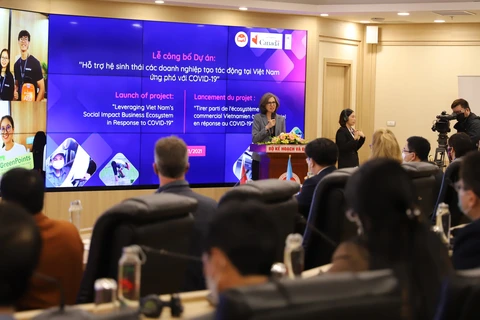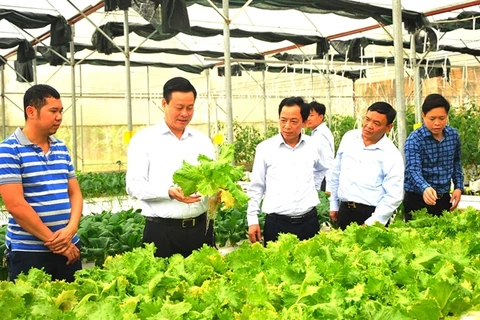 The Social Impact Businesses of the COVID-19 Adaptation Programme 2022 are announced on July 26. (Photo: MPI)
The Social Impact Businesses of the COVID-19 Adaptation Programme 2022 are announced on July 26. (Photo: MPI)The announcement was made at an event on July 26 co-hosted by the Agency of Enterprise Development (AED) under the Ministry of Planning and Investment (MPI), Global Affairs Canada (GAC), and the UN Development Programme (UNDP) to announce “The Social Impact Businesses of the COVID-19 Adaptation Programme 2022”.
Addressing the event, AED General Director Le Manh Hung said in the implementation of sustainable development goals, SIBs are an essential component not only in making a contribution to economic development but also in creating positive impacts on society and the environment by creating jobs and providing products and services for disadvantaged groups in society.”
“The COVID-19 Adaptation Programme is such a meaningful, necessary, and comprehensive support project both financially and technically in order to help SIBs overcome the challenges of COVID-19 and to restore production,” he said.
“In the upcoming months, the selected SIBs will receive financial support and participate in the 1:1 coaching programme with three incubators to solve specific problems in management, business, and product development, thereby contributing to the improvement of SIB's capacity to recover and further develop."
Despite a vibrant and diverse ecosystem for SIBs, Vietnamese businesses are facing multiple challenges to balance profits and creating social impacts in developing sustainable business models. The challenges have further increased due to COVID-19.
In April, the “Leveraging Vietnam’s Social Impact Business Ecosystem in Response to COVID-19” – ISEE-COVID project launched the COVID-19 Adaptation Programme to support SIBs in the agriculture and tourism industries, focusing on those led by women and vulnerable groups.
Over 150 SIBs submitted an Expression of Interest, and as a result, 29 SIBs from across Vietnam were selected for the programme. Of them, 20 are led by women and four by persons with disabilities.
“It’s inspiring to see such a diversity of ideas from women-led businesses, ranging from high-quality made-in-Vietnam products to new innovative ideas such as using larva to turn leftover foods into organic fertilizer, and a new rice cultivation method that saves costs, circulates nutrients and reduces greenhouse gas,” said UNDP Resident Representative in Vietnam Caitlin Wiesen.
With the reopening of Vietnamese tourism, she hoped that creative models such as ‘dining in the dark’, innovative community tourism, and the application of reducing waste in the tourism sector will grow quickly. The ISEE-COVID project is building a critically important ecosystem for such social impact businesses to succeed and scale, she said.
Three inspiring incubators – BizCare, Wise and Angle4Us – will be working closely with the selected SIBs in the next six months to identify critical challenges due to COVID-19; design new business models or develop new products/services to adapt to the pandemic; and build and test prototypes of products/services with the seed funding./.
VNA





















